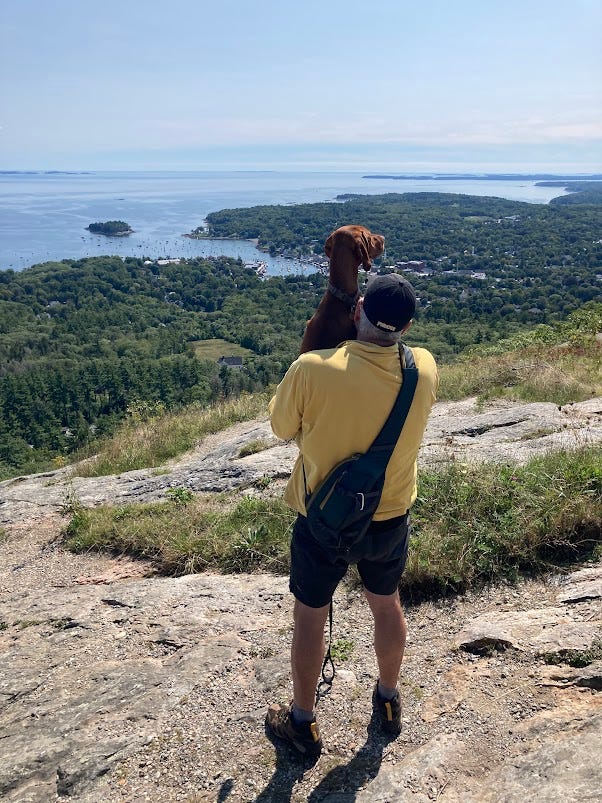If I had to distill Out of Babel into a single question, it’s this one:
Do Jews and their Story have a future in the Diaspora?
If you’re interested in an answer — one that does NOT focus on hate, intolerance, or anti-Semitism — then you’ll also be interested in this newsletter.
Want a little background about this project — and about me — before you subscribe? If so, please keep reading…

Do Jews and their Story have a future in the Diaspora?
I’m dying to know the answer for two reasons:
I’m Jewish and I live in the United States (outside of Israel, aka the Diaspora). So this question is not an academic one for me.
Jews have been wandering the world for millennia with a Book, which tells a Story that suggests our current historic moment is precarious — for Jews and non-Jews alike. It’s also dangerous and painfully familiar: Just yesterday, someone spray-painted “JEWS NOT WELCOME” on a sign in front of the local public high school where my kids were students a few years ago.
And last month, a few miles away:
Yes, this is anti-Semitic. But…
Such hate and intolerance are the symptoms, not the cause, of a much deeper cultural problem and existential sickness.
The public response to these incidents is usually some mixture of diversity training, Holocaust education, and the repetition of feel-good mantras like “Hate has no home here.” But I’m afraid this diagnosis and response miss a bigger and far more interesting possibility…
The Stories We Live By
The Jewish Story — about slavery, liberation, covenant, community, and the eventual redemption of the world — is just one of many “master narratives” about human history, identity, and meaning. Christians and Muslims each have a closely related but fundamentally different Story. Buddhists, Mormons, Marxists, secular humanists, nihilists, nationalists, liberal democrats, libertarians, white supremacists, black separatists, neo-pagans, and other groups each have a story, too, with plot lines that often move in dramatically different directions.
Those narrative differences are not a problem when we, as a multicultural and democratic community, believe diversity is a strength. But when the profound tensions and logical contradictions between these Stories seem unresolvable and existentially unbearable, things fall apart.
Israel: A Maddening Plot Point
Here’s just one example: Is the modern nation-state of Israel an “echo of eternity” and the glorious fulfillment of a prophetic promise? Or: a meaningless cul-de-sac for the people who still reject Jesus? Or: a political, geographic, and theological stick-in-the-eye to Muslims who see Zionism as evidence that History is moving in the wrong direction? Or: an exploitative colonial project of Western capitalists? Or: another chapter of the Darwinian adventure Apes With iPhones? Or: [your favorite worldview here]?
These narratives often contradict each other, which can be frustrating: If that other guy’s story is true, then mine must be nonsense. As people struggle to resolve these contradictions so their own stories still make sense, temperatures rise. With the pillars of their identity showing some cracks, people get frightened. Or angry. And soon some long-accepted truisms about diversity and multiculturalism — such as “All Paths Are Good” and “Jews have a future in the Diaspora” — don’t seem quite so true anymore.
The stories we live by are like the Earth’s tectonic plates: big, slow-moving, and essential to our existence. But when they collide, the world trembles, structures collapse, and the people and things we cherish disappear beneath the rubble.
Earthquakes are not inevitable
Out of Babel is my attempt to explore the fault lines between these narratives — especially between the Jewish story and the ones that are immediately adjacent. Because while earthquakes are a force of nature, stories are not. We write them. We interpret them. We have some control over what happens next.
And while there’s so much I don’t know, I do know this: Our Story isn’t over because it’s still an open Book.
I hope you’ll join me. Actually, join us. My dog, Maisie, is coming along, too. Yes, she’s adorable clickbait. But she’s also a joyful traveling companion who never seems worried about the things that worry me. How could I possibly leave her at home?
About me
I’m Alan Mairson, and for almost 20 years I was a staff writer and editor for National Geographic magazine, where I told lots of stories to millions of people.
Working at National Geographic was my dream job. But as the years went by, I gradually lost my faith that the stories journalists tell have the power to change anything of consequence. Here are just three reasons why:
Facts don’t matter as much as we think—or so says this Nobel laureate.
Stories don’t move people in the way journalists have long hoped—or so says this winner of the Pulitzer Prize.
“When you ask yourself what you can do with what you have learned on the news, you see that it only permits you to consume subsequent news more conversantly.”
If you follow the links above, you’ll discover Towers of Babel, where since 2019 I’ve been documenting our culture’s current obsession with stories. We love them. We can’t get enough of them because “stories are how we create meaning” and “people are wired for story” and “each of us has a story to tell” and “everything is narrative.” (Someone, please… stop the madness.)
And so—brick upon brick, story upon story—we’ve built ourselves a sprawling metropolis filled with narrative ziggurats that dominate our media landscape and our minds.
This is not a benign development. It’s a real danger. In fact, I’ve long feared that our love of stories has become an addiction—and it’s killing us.
The good news is: There might be an antidote. People have been blazing trails out of Babel for generations, looking for something better. My plan is to follow in their footsteps and explore the lands that they will show me.
I hope you’ll join us.
(posted on 18 December 2022)









